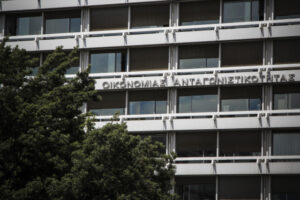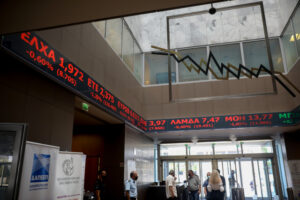A package of specific measures to reduce the monthly cost of fast Internet tariffs by up to €10 are being promoted by the government and the Ministry of Digital Governance, aiming to accelerate the growth prospects opened up by the transition to the digital era.
The announcement by Prime Minister Kyriakos Mitsotakis at the TIF to abolish the 5% fee on fixed telephony and Internet subscribers’ tariffs with optical fibre and speeds of 100 Mbps and above will, according to fiscal estimates, bring 2 to 4 euro reductions in bills for households and businesses. At the same time, significant savings of up to €6 (€10 in total) are expected to be made by almost 400,000 beneficiaries (households and businesses) of the Gigabit Voucher. This is a voucher to subsidize connection fees and monthly fixed monthly fee for 2 years with 200 euros.
The crucial double bet that the government is trying to achieve with these initiatives is to bring down the admittedly high Internet prices and at the same time increase the number of subscribers to the high-speed broadband network. It is common knowledge that our country has the most expensive and slowest Internet access, which is why the government appears determined to change this picture by taking all those measures that will bring down prices and increase speeds.
Removal of the fee
The abolition of the special fixed-line tax for fibre-optic connections and speeds of 100 Mbps and above was one of 12 tax cuts announced by the prime minister at the TIF that will come into force from 2025. The fiscal cost is estimated by finance ministry officials at €24 million a year, and the measure is part of the government’s overall effort to promote the digitisation of the economy and provide cheaper and faster internet to businesses and households.
For example, a fibre-optic connection package at 100 Mbps at a current cost of €38 can drop to €34-36 after the removal of the special tax, just €5-7 more than a plan at 24 Mbps, but offering up to 6 times faster but reliable speeds. In this way, low-speed and outdated ADSL subscribers will be able to move into the era of fibre optics, which offer greater stability and reliability. At the same time, the cost reduction will contribute to improving national indicators for average Internet access speeds and to the expansion of optical networks, thus boosting the country’s technological development. It should be noted that agents of the Ministry of Digital Governance expect further reductions in fiber optic network prices in the near future from wholesale discounts, as well as from the entry of new wholesale providers into the market.
Coupon 200 euros
In addition to these, the broader planning of the Ministry of Digital Governance for the penetration of broadband throughout the country includes the utilization of resources from the Recovery Fund. In this context, Smart Readiness for subsidizing the cost of in-building optical cabling and Gigabit Voucher for subsidizing the cost of connection are being implemented. Through Smart Readiness, 120,000 buildings are being funded to install structured fibre optic cabling, with a total cost of €100 million. Through the Gigabit Voucher, the cost of upgrading a simple connection to broadband above 250 Mbps for 400,000 subscribers is financed at a total subsidy cost of €80 million. The relevant platform for the call for expressions of interest is expected to open in September. Beneficiaries will cross-check their details through Taxisnet and then issue the voucher by selecting the provider they connect to.
Alongside the actions for digital upgrades for households and businesses, the government is pushing for a sweeping expansion of connectivity in public spaces and public transport. According to sources in the Ministry of Digital Governance, which is implementing the relevant programs, work on installing WiFi at all metro stations is progressing rapidly. The network is already operating at Acropolis station, while in the next few days work is expected to be completed at Syntagma. At the same time, providers in cooperation with Stasi are deploying 5G networks on Line 2 (red). According to reports, pilot tests at 5 stations, from Elliniko to Agios Dimitrios, have been successfully completed and now plans are underway to expand across the entire transport network.

However, just as the government is launching measures to decompress fixed telephony tariffs major telecom companies have rushed to raise the cost of fixed rates by 3 to 5 euros, especially on contracts covered by the government discounts (ie: high-speed from 100 Mbps and above). The companies’ action has reportedly drawn the ire of the Grand Maximus and the prime minister personally. The same sources tell protothema.gr that already both the Minister of State Akis Skertos and the Minister of Digital Governance Dimitris Papastergiou have sent a strict message to the providers to immediately withdraw any relevant action. “We will not allow some people to profit from measures aimed solely at relieving citizens,” government sources said.
Ask me anything
Explore related questions





